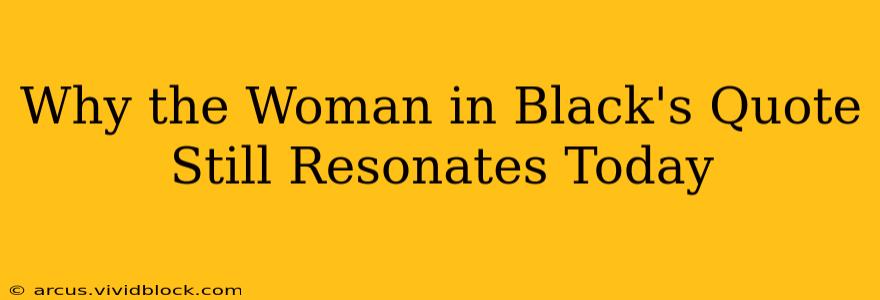Susan Hill's chilling gothic novel, The Woman in Black, published in 1983, continues to resonate with readers decades later. While the novel itself is filled with suspense and dread, it's a particular quote that continues to capture the imagination and provoke thought: "Nothing is ever quite what it seems." This seemingly simple sentence encapsulates a profound truth about life, fear, and the human experience, making it a timeless and relevant statement even in the modern world. This essay will explore why this quote remains so powerful and impactful, examining its significance within the context of the novel and its broader implications for contemporary life.
What Makes This Quote So Enduring?
The enduring power of "Nothing is ever quite what it seems" lies in its ambiguity and its universality. It's a statement that can be applied to countless situations and interpretations. It's not just a plot device within The Woman in Black; it's a philosophical observation that speaks to the inherent uncertainty and deceptiveness of reality.
Within the novel itself, the quote acts as a constant reminder to the reader, and to Arthur Kipps, the protagonist, that appearances are often deceiving. The seemingly quiet and idyllic town of Crythin Gifford hides a dark and terrifying secret, and the seemingly harmless woman in black is anything but. This ambiguity fuels the suspense and keeps the reader guessing, always questioning the true nature of what they are witnessing.
Beyond the Novel: Applying "Nothing is Ever Quite What it Seems" to Modern Life
The quote's resonance extends far beyond the confines of a gothic horror novel. In our modern world, saturated with information (and misinformation), the phrase acts as a potent warning against accepting things at face value. Consider these applications:
The pervasiveness of misinformation and "fake news": In today's digital age, we are constantly bombarded with information from various sources, making it crucial to critically evaluate what we see and hear. "Nothing is ever quite what it seems" serves as a reminder to question narratives and investigate the sources of information before accepting them as truth.
The complexities of human relationships: People often present a carefully curated version of themselves to the world, hiding insecurities, anxieties, and darker aspects of their personalities. The quote reminds us to look beyond surface appearances and to understand that people are rarely as simple as they initially seem.
The nature of fear and trauma: Often, the most frightening things are not what we initially perceive them to be. Our fears can be rooted in misunderstanding, misinterpretations, and projections of our own anxieties. The quote encourages a deeper exploration of the source of our fears, rather than simply accepting them as they initially appear.
The ambiguity of appearances: A visually striking person might not possess the moral character suggested by their looks. A seemingly successful enterprise could be built on dubious practices. The allure of a fast solution may hide long-term consequences.
Frequently Asked Questions (FAQ)
Here are some common questions surrounding the quote and its impact:
Why is this quote so effective in horror?
The quote's effectiveness in horror stems from its ability to create an atmosphere of unease and suspicion. It plants a seed of doubt in the reader's mind, making them question everything they see and hear. This constant uncertainty intensifies the sense of dread and suspense, leaving the reader constantly on edge.
How does this quote relate to psychological thrillers?
The quote is equally powerful in psychological thrillers, where the manipulation and deception of characters are central to the plot. It highlights the unreliability of narrators and the deceptive nature of appearances, leading to unexpected twists and turns that keep the reader guessing until the very end.
Can this quote be applied to everyday life situations?
Absolutely! The quote's applicability extends to everyday life situations, reminding us to be critical thinkers and to question assumptions. It encourages us to look beyond the surface and to consider the deeper implications of what we see and experience. Whether it's a job opportunity that sounds too good to be true or a relationship that feels off, "nothing is ever quite what it seems" serves as a valuable reminder to proceed with caution and investigate further.
In conclusion, the enduring power of "Nothing is ever quite what it seems" lies in its simplicity, ambiguity, and profound relevance to the human experience. It's a quote that transcends the specific context of The Woman in Black and continues to resonate with readers today because it speaks to the fundamental uncertainties and complexities of the world around us, prompting us to question, to investigate, and to never accept things at face value.

